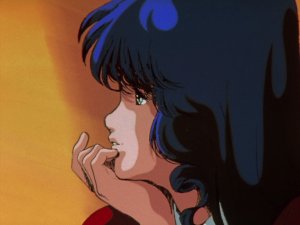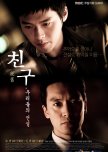Despite the wide success of his 2001 blockbuster "Friend", director Kwak Kyung Taek remained unsatisfied with the final product. Movies, after all, have limited run-times, and this one held sentimental value; much of it was autobiographical, drawn from important friends and memories gained while growing up in Busan. So that better justice might be done to such a personal story, the director ultimately rebooted it, bringing it to MBC as a 20-episode drama entitled "Friend, Our Legend". What aired on that network, nearly a decade removed from the original film release, must have done Director Kwak proud. This drama is sheer quality, a near masterpiece.
One enormous difference from other South Korean programs becomes apparent even before the series starts. Friend, Our Legend holds the distinction of being one of relatively few pre-produced dramas in that country. Free from pressure brought down by viewer feedback and ratings, no sudden crises could derail the vision. The effect is immediately noticeable when a story is told as intended.
On the surface, the aforementioned story appears to be nothing special. It is “merely” the tale of four close friends, whose troubled lives follow very different (and sometimes tragic) paths. Instead of falling into pitfalls of humdrum cliche or weepy melodrama, Friend, Our Legend elevates itself to an almost epic human story. Perhaps the plot moves slowly at times, but a subdued pace allows for the greatest understanding of characters and their circumstances. Viewers follow them through their lives, watching through childhood, right into high-school and adulthood. This aspect creates the sensation of knowing everyone in the drama intimately. Above all, realism might be the best thing Friend, Our Legend has going for it; even gangster culture is portrayed violently and without glamour…as it ought to be.
There’s always a catch, of course. Friend, Our Legend hurts to watch. Rather badly, in fact. I cannot, in good conscience, recommend this series to any empathetic or sensitive viewers. It is a violent and tragic experience, grim and heartrending. Bright spots exist in the narrative, but one always senses the storm will soon return. One should not expect to walk away from this experience smiling, but that isn't always the point. Sometimes the point is to become wholly immersed, to be affected, to think and feel deeply.
Actual problems do exist. One thing which didn't work for me was the unique flashback technique used in initial episodes. These sketch out the end-game of the drama, supposedly to drum up interest for the “how” of events rather than the “what.” This smacked of gimmick, as a linear telling would have done the trick without any of the added confusion. There was enough foreshadowing in the main body of the drama anyway. At the very least, it does not detract from enjoyment.
Are you a fan of Hyun Bin? If you said “No,” sit down with this and you will be. If your answer was “Yes,” tune into Friend, Our Legend immediately. Han Dong Soo might be the greatest role of his career thus far. “But what about Secret Garden?” you might ask. As well as Hyun Bin performed in that lovable drama, consider it a mere shadow of his work here. An actor might search his entire life for a particular character, a complicated and difficult one, the true challenge. Hyun Bin not only found his in Dong Soo, but completely inhabited and owned it. How incredible to watch a character as he evolves so completely.
Talented Kim Min Joon, who seems to catch my eye often nowadays, also captivated me as Lee Joon Seok. He might be chronically plagued by bad hair and fashion crimes throughout, but the character allowed him to showcase enormous range. Working with co-star Hyun Bin, he made me believe in the friendship between Dong Soo and Joon Seok...and many other things besides. In the form of Choi Jin Sook, Wang Ji Hye finally strikes a role to impress. My estimation of her rose from a pleasant presence to serious artist, all within the span of a few episodes. Though she leads a harsh existence, her Jin Sook displays strength and individualism that never allow her to be just "the love interest." This can be attributed to Ji Hye as much as the script.
Of the supporting cast, Seo Do Young fills up the roster steadily, while Lee Shi Yun refreshes with much-needed comic relief.
I loved the majority of the soundtrack to the depths of my heart and back. Other than some dated misses, especially suspense and gangster-centric sequences, everything fell mostly on point. Emotional scenes were often accompanied by mellow violins or a quiet, nostalgic female vocal, lifting them to new heights. Among the many fantastic inserts are “Closer” (Alex), “Can’t Have You” (Hyun Bin), and “Go and Erase Your Tears” (SS501’s Heo Young Saeng). Fans of Big Bang will also recognize “Friend,” (Tae Yang and T.O.P).
Was this review helpful to you?























